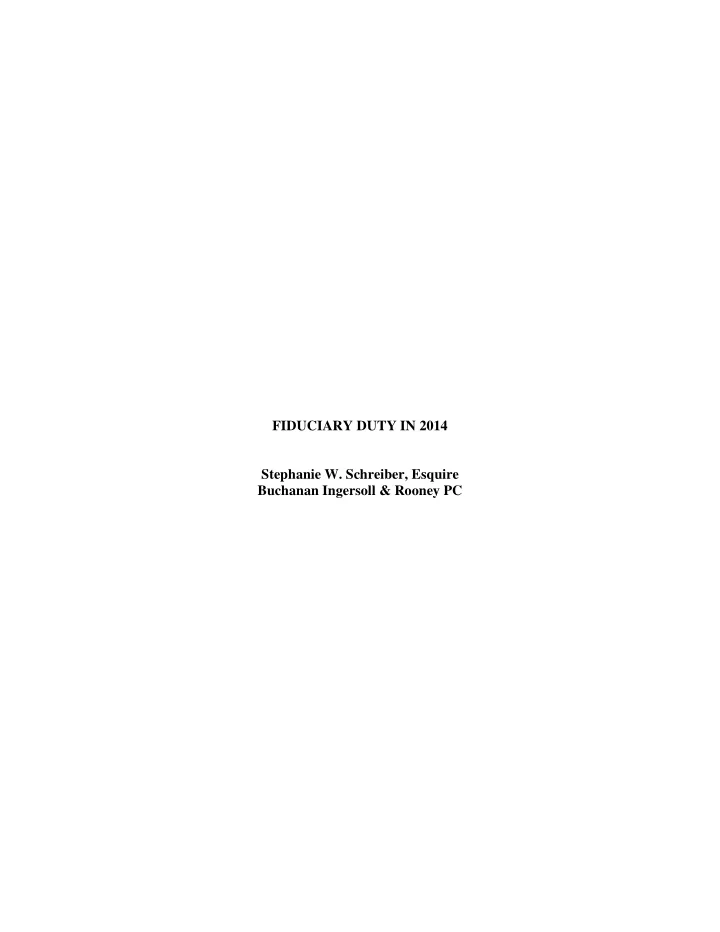

FIDUCIARY DUTY IN 2014 Stephanie W. Schreiber, Esquire Buchanan Ingersoll & Rooney PC
SECTION 1 Duties of Directors I. Overview We know that directors and officers of a nonprofit corporation hold a fiduciary duty. But, what is a fiduciary? The dictionary definition of a fiduciary means “of or relating to a holding of something in trust for another.” In the nonprofit world, “another” is the nonprofit entity itself as well as for the benefit of the public. In 2014, the term fiduciary and the impact it has on the role of directors, is more heightened than we have seen in many years. Looking back over the past 15 years, we have seen many changes. First, following the Allegheny Health Education and Research Foundation bankruptcy in 1998, nonprofit hospitals' boards of directors began being held to a higher standard of corporate governance. No longer would it be acceptable for nonprofit hospital board members to simply rubber stamp the actions of management. Core legal requirements for nonprofit directors, such as exercising their duty of loyalty and duty of care, would become enforceable obligations. Over the following few years, corporate scandals such as Enron, World Com, Health South and Arthur Anderson would further highlight the risks of poor corporate governance. Then in 2002, in order to attempt to rebuild trust in corporate America, congress passed the American Competitiveness and Corporate Accountability Act of 2002 ("Sarbanes-Oxley"). While virtually all of Sarbanes-Oxley applies only to publicly traded companies, it became a wake-up call to nonprofit organizations. While nonprofits are not bound by Sarbanes-Oxley, there are, however, sections of Sarbanes-Oxley which provide guidance for nonprofits and which nonprofit hospital boards should seriously consider. The first of which is the establishment of an independent audit committee. Like under Sarbanes-Oxley, the nonprofit hospital board audit committee should be comprised of independent directors (not management) who do not receive compensation (directly or indirectly) for serving on the audit committee. At least one member of the audit committee should qualify as a financial expert. The tasks of the audit committee would include overseeing the hospital's independent auditor, setting compensation and establishing procedures for handling complaints regarding internal financial matters. Additionally, all board members, as part of their board training, should receive basic financial literacy training so that they can understand board financial reports and budgets. Under Sarbanes-Oxley, the company CEO and CFO must certify the company's financial statements. While nonprofit CEOs and CFOs do not have the same legal responsibility, such individuals should fully review all Form 990's before filing to ensure accuracy and completeness. Also, all audit reports should be fully reviewed by both the CEO and CFO.
Sarbanes-Oxley's whistleblower protections should also be carried over to the nonprofit sector with respect to accounting practices and other financial matters. Hospitals should review their whistleblower policies relating to fraud and abuse to see if they include mechanisms for reporting (and protection from retaliation for reporting) matters relating to accounting practices and other financial matters. The document destruction protections set forth in Sarbanes-Oxley also should be applicable to nonprofit hospitals. While most hospitals have in place stringent document retention policies, these should be reviewed to ensure that they include electronic files and financial and other business records. Now in 2014, funding for nonprofits has been significantly reduced, the need for nonprofit services has significantly increased and reimbursement for nonprofit healthcare services has been cut. Each of these factors has contributed to many nonprofits: (i) shutting down their doors; (ii) dissolving; (iii) entering into strategic affiliations with other nonprofits; and/or (iv) becoming part of a larger nonprofit or for-profit system. The common factor is often that the nonprofit can no longer survive on its own. This potential failure raises the question of whether the failure was due to: (i) the economic times and circumstances; (ii) a breach of fiduciary duty by the directors and officers; or (iii) decisions by the officers and directors that are covered by the business judgment rule. In December 2013, the Tribune Review reported that Pennsylvania Attorney General, Kathleen Kane was investigating two Western Pennsylvania nonprofit corporations: The August Wilson Center and Conneaut Lake Park. Each of these cases came under review by the Office of Attorney General following financial difficulties. Specifically, in Conneaut Lake Park, the Tribune Review reported, that the trustees failed to pay taxes and maintain fire insurance on its ballroom that was destroyed in 2007. With respect to the August Wilson Center, the nonprofit fell behind on its mortgage payments, ending in foreclosure. In the article, Jon Peters, a spokesperson for the Attorney General Kane, stated that “the office has a responsibility to hold board members to their fiduciary duty under the Commonwealth Attorneys Act 1 … and when someone takes a position on a board, they knowingly take on that fiduciary obligation.” The question arises as to whether or not there was a breach of fiduciary duty by the boards. Even if no breach occurred, no nonprofit volunteer director wants his or her name, or the organization he or she serves, in the newspaper in connection with an investigation or subject to an investigation by the Attorney General’s Office. We are in an era of evolving responsibilities for directors due in part to increased governmental oversight and the IRS’ emphasis on scrutiny and transparency. Lax institutional governance patterns will no longer be tolerated and directors must be well versed in their corporate and fiduciary responsibilities. II. Duty of Care. Under a duty of care, directors, officers and senior managers of a nonprofit organization must use the degree of care, skill, caution and diligence that a prudent person would use in handling 1 Commonwealth Attorneys Act, 71 P.S. § 732, et seq .
Recommend
More recommend